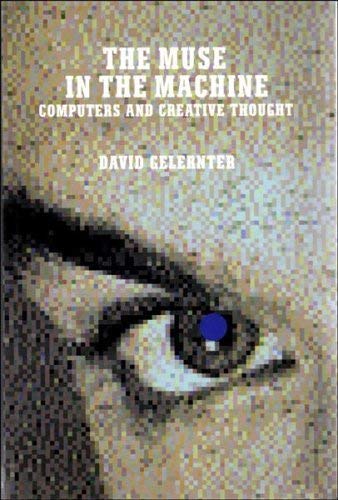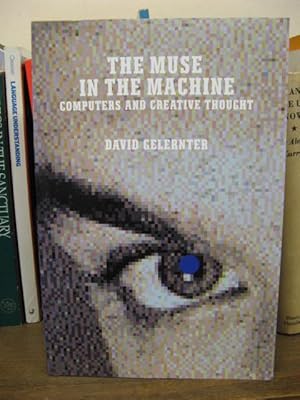Muse Machine Computers Creative by Gelernter David (7 results)
Search filters
Product Type
- All Product Types
- Books (7)
- Magazines & Periodicals (No further results match this refinement)
- Comics (No further results match this refinement)
- Sheet Music (No further results match this refinement)
- Art, Prints & Posters (No further results match this refinement)
- Photographs (No further results match this refinement)
- Maps (No further results match this refinement)
- Manuscripts & Paper Collectibles (No further results match this refinement)
Condition Learn more
- New (1)
- As New, Fine or Near Fine (2)
- Very Good or Good (3)
- Fair or Poor (No further results match this refinement)
- As Described (1)
Binding
Collectible Attributes
- First Edition (1)
- Signed (No further results match this refinement)
- Dust Jacket (2)
- Seller-Supplied Images (4)
- Not Print on Demand (7)
Language (2)
Price
- Any Price
- Under £ 20
- £ 20 to £ 35 (No further results match this refinement)
- Over £ 35 (No further results match this refinement)
Free Shipping
- Free Shipping to U.S.A. (No further results match this refinement)
Seller Location
Seller Rating
-
The Muse In the Machine: Computers and Creative Thought
Language: English
Published by Fourth Estate, London, 1994
ISBN 10: 1857020839 ISBN 13: 9781857020830
Seller: WorldofBooks, Goring-By-Sea, WS, United Kingdom
Hardback. Condition: Very Good. The book has been read, but is in excellent condition. Pages are intact and not marred by notes or highlighting. The spine remains undamaged.
-
The Muse in the Machine: Computers and Creative Though
Language: English
Published by Fourth Estate, London, 1994
ISBN 10: 1857020839 ISBN 13: 9781857020830
Seller: PsychoBabel & Skoob Books, Didcot, United Kingdom
Paperback. Condition: Good. Paperback in good condition. A few scores and creases on covers. Minor bump and wear on spine foot. Front lower and rear upper leading corners are slightly bent, affecting pages. A few marks on page block. Stains on page 13. Contents are clear. AM. Used.
-
THE MUSE IN THE MACHINE Computers and Creative Thought
Language: English
Published by Fourth Estate, London, 1994
ISBN 10: 1857020839 ISBN 13: 9781857020830
Seller: Amazing Book Company, Liphook, United Kingdom
First Edition
Hardcover. Condition: New. Dust Jacket Condition: New. 1st Edition. This copy is in new, unmarked condition bound in black cloth covered boards with bright gilt titling to the spine. This copy is bright, tight, white and square. There is an attractive book plate to the front paste down. The unclipped dust wrapper is in new condition. International postal rates are calculated on a book weighing 1 Kilo, in cases where the book weighs more than 1 Kilo increased postal rates will be quoted, where the book weighs less then postage will be reduced accordingly. Examines the full spectrum of human cognition--including creativity, common sense, spirituality, and dreaming--describes the role that emotion plays in these thought processes, and explains how it is possible to introduce emotions into artificial intelligence systems. This book is a work of genius. It's unmissable if you are at all involved in the robotics/artificial intelligence debate. In short he argues that machines will become more powerful but they will never be able to engage in metaphors or similes like a human can. This is where all creativity begins - in the leaps and bounds of imagination where we string together seemingly unrelated things, an idea Arthur Koestler explored in depth in his book, The Act of Creation. Ref III 3.
-
The muse in the machine : computers and creative thought
Language: English
Published by London Fourth Estate 1994, 1994
ISBN 10: 1857020839 ISBN 13: 9781857020830
Seller: Dial-A-Book, NARRABEEN, NSW, Australia
Condition: Very Good. 8vo hardcover 211pp index. very good+ / very good+ d/w. Designed for a wide audience, this book claims that the standard approach to human thought is wrong in fundamental ways. The author challenges, in particular, the views of Daniel Dennett ("Consciousness Explained") and Roger Penrose ("The Emperor's New Mind"): first, emotion is a necessary part of thought and so a thinking computer will not be possible until a feeling computer is possible; second, reasoning, logic and analysis are only part of the way we think - there are also other kinds of thinking, such as poetic and religious; third, the nature of thought is intertwined with the nature of art. He also discusses philosophy, psychology, technology, art and literature, in particular the poetry of Wordsworth, Blake, Keats and the Bible.
-
The Muse In The Machine: Computers And Creative Thought
Published by Fourth Estate, London, 1994
Seller: Book Grocer, Tullamarine, VIC, Australia
Paperback. David Gelernter, Fourth Estate, London. Author: David GelernterBinding: PaperbackPublished: Fourth Estate, London, 1994Condition:Book: Very goodJacket: No dust jacketPages: GoodMarkings: No markingsCondition remarks: Condition as shown in imageIn this insightful work of non-fiction, David Gelernter presents a compelling argument about the nature of human creativity and its relationship to the burgeoning field of artificial intelligence. He challenges conventional notions of thought, illustrating how the human mind operates on a spectrum from high-focus, logical reasoning to a more diffuse, associative mode akin to dreaming. Gelernter argues that true creative thought resides in this lower-focus, "dream-like" state, a realm that computers, despite their processing power, cannot replicate. This book offers a profound meditation on consciousness, technology, and the unique qualities that define human intellect, making it essential reading for anyone interested in the intersection of philosophy, psychology, and computer science. Paperback.
-
The Muse in the Machine. Computers and Creative Thought.
Language: English
Published by London: Fourth Estate, 1994
ISBN 10: 1857020839 ISBN 13: 9781857020830
Seller: Fundus-Online GbR Borkert Schwarz Zerfaß, Berlin, Germany
Cloth with dust jacket. Condition: Sehr gut. 211 p. Der Schutzumschlag ist hinten leicht berieben, ansonsten ein sehr gutes und sauberes Exemplar ohne Anstreichungen. The dust jacket is slightly rubbed on the spine, otherwise a very good and clean copy without markings. - Contents - Acknowledgments - 1. A New Folk Psychology - 2. State of the Art - 3. Cognitive Pulse, and the Reality of Focus - 4. High - 5. Low - 6. The Spectrum on a Computer? - 7. Philosophical Consequences - 8. Ancient Thought - 9. Conclusion: Why.? - References - Index. ISBN 9781857020830 Sprache: Englisch Gewicht in Gramm: 480.
-
THE MUSE IN THE MACHINE. Computers and Creative Thought
Seller: Butterfly Books GmbH & Co. KG, Herzebrock-Clarholz, Germany
Taschenbuch oder Softcover. Condition: Sehr gut. Zustand: SEHR GUTER Zustand! Englisch 354g.







